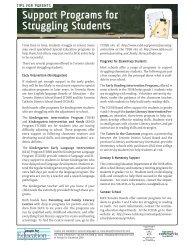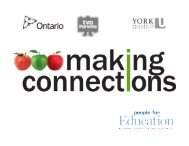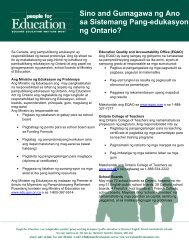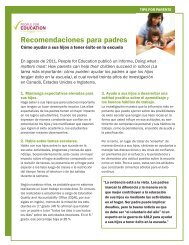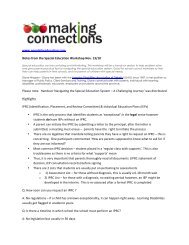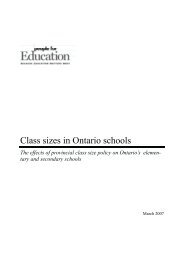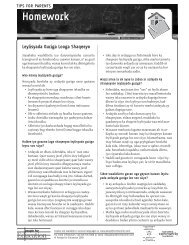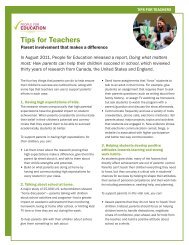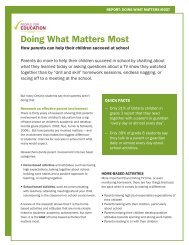Our Children Our Future Our Vision - People for Education
Our Children Our Future Our Vision - People for Education
Our Children Our Future Our Vision - People for Education
You also want an ePaper? Increase the reach of your titles
YUMPU automatically turns print PDFs into web optimized ePapers that Google loves.
<strong>Our</strong> <strong>Children</strong>, <strong>Our</strong> <strong>Future</strong>, <strong>Our</strong> <strong>Vision</strong><br />
impacts that this assimilatory policy had on First Nations. Subsequently however, Minister of Indian<br />
Affairs John Duncan attempted to minimize Canada’s culpability by describing residential schools as<br />
“a policy gone wrong” and denied that it was a <strong>for</strong>m of “cultural genocide” or that it was “lethal”. 66<br />
Neither in the apology or subsequent statements has there been recognition of the Treaty right to<br />
education, an increase in funding <strong>for</strong> language preservation, a <strong>for</strong>mal repeal of the 2% funding<br />
cap, or the implementation of First Nations’ jurisdictions to manage our own education systems.<br />
Residential school policy may now be a thing of the past, but the assimilatory educational agenda<br />
continues in provincial schools. Many provincial schools do not teach Indigenous languages, philosophies,<br />
or traditional knowledge or practices, but instead rein<strong>for</strong>ce the histories, stories, heroes,<br />
values, ideologies, and knowledge systems of the dominant society.<br />
The closing of residential schools and the subsequent transfer of Indigenous children to provincial<br />
schools has been no less destructive to traditional Indigenous knowledge systems and languages.<br />
This combined with the substantial increase in the numbers of children being taken from their<br />
families and communities and placed in foster care results in similar effects.<br />
Even with provincial teachers who are sympathetic to and knowledgeable about First Nations, they<br />
are not the traditional knowledge holders or language speakers and thus cannot stand in place of<br />
First Nation education systems. The fact of separation of language speakers from their children<br />
and grandchildren denies them the opportunity to pass on the language. 67 The message in provincial<br />
schools is that the dominant language is more important which results in Indigenous children<br />
speaking their language less and less. Bear-Nicholas argues that not only does provincial control<br />
of education result in the loss of Indigenous languages and cultures, but it also results in serious<br />
mental harm to Indigenous children “which in turn plays a central role in the low academic per<strong>for</strong>mance<br />
rates of Indigenous children” – a process known as “cognitive assimilation”. 68<br />
But it is unequivocally assimilation since Indigenous children who<br />
manage to complete subtractive education programs must also<br />
assimilate to a considerable degree to the culture of the dominant<br />
society in order to succeed. As a result, the only real choices offered<br />
to Indigenous children in subtractive education are the choices of<br />
Students of Indian Residential Schools” (11 June 2008), online: INAC <br />
[Apology].<br />
66 APTN National News, “Saganash calls on Duncan to apologize over residential schools comment” (27 October<br />
2011), online: APTN . See<br />
also: J. Barrera, APTN National News, “Federal official wanted emails deleted outlining plan to stonewall on residential<br />
school genocide questions” (13 January 2012), online: APTN .<br />
67 A. Bear-Nicholas, “<strong>Education</strong>al Policy <strong>for</strong> First Nations in New Brunswick: Continuing Linguistic Genocide and<br />
<strong>Education</strong>al Failure or Positive Linguistic Rights and <strong>Education</strong>al Success?” (Fredericton: Andrea Bear-Nicholas,<br />
2008), online: [Linguistic<br />
Genocide] at 3.<br />
68 Ibid. at 4. These mental harms include: “social dislocation, psychological, cognitive, linguistic, and educational harm”.<br />
Chiefs of Ontario<br />
14



